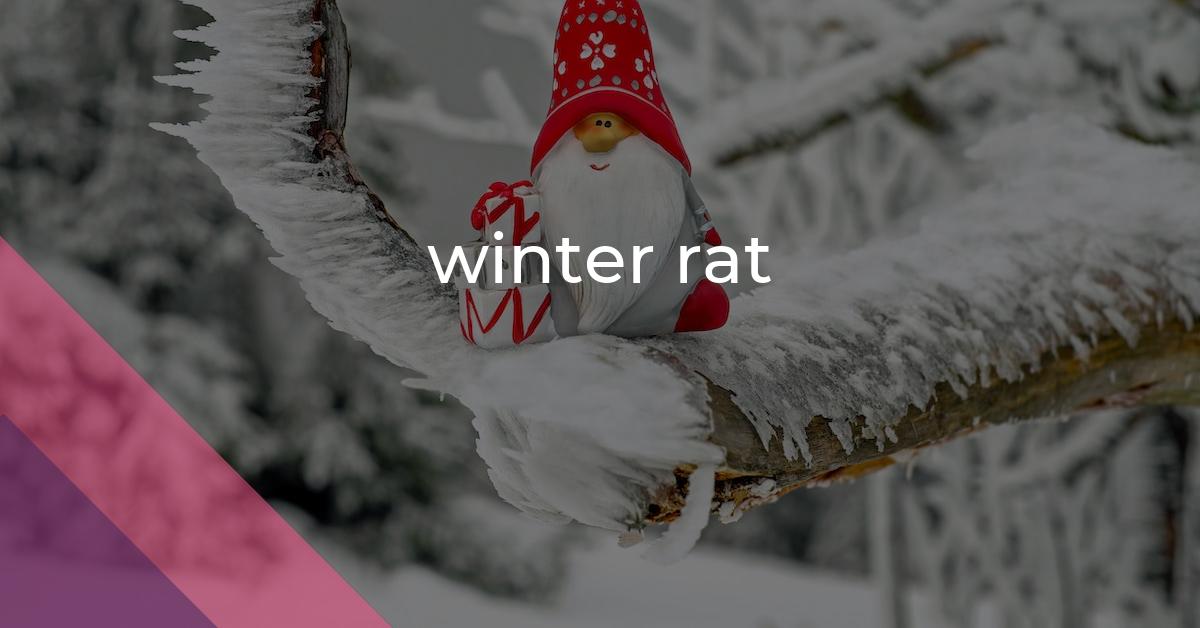winter rat: Idiom Meaning and Origin
What does ‘winter rat’ mean?
The idiom "winter rat" refers to a person who only shows up or appears during difficult or challenging times, but is absent during times of ease or prosperity.

Idiom Explorer
The idiom "when Hell freezes over" means that something is extremely unlikely or will never happen.
The idiom "walk in the snow" refers to a difficult or challenging task that requires extra effort and perseverance. It suggests overcoming obstacles and making progress despite unfavorable conditions. This idiom emphasizes the need for resilience and determination when faced with adversity.
An idiom that means someone is very poor and has no money.
The idiom "summer and winter" refers to the two extreme seasons that represent opposite conditions or moods. It is often used metaphorically to describe a stark contrast or a wide range of differences between two things or situations.
The idiom "stormy weather" refers to a period of difficult and turbulent times or circumstances, often related to emotional or challenging situations.
The idiom "rough trot" refers to a difficult or challenging period of time or situation. It conveys the idea of facing hardships or experiencing a series of problems.
The idiom *rough patch* refers to a difficult or challenging period of time in someone's life or a situation. It implies that things are not going well and there are obstacles or problems to overcome.
An idiom often used to describe a person who is disliked or considered bad, with negative qualities or behavior.
Deciphering Frosty Rascals
Winter rat is an idiom that originated in the United States, although its exact origins are unclear. It is used to describe someone who seeks shelter or refuge from the cold weather during the winter months, often at the expense of others. The term "rat" in this context refers to a person who is perceived as untrustworthy or deceitful.
One possible explanation for the origin of the term is tied to the behavior of rats during the winter season. Rats seek warmth and shelter in human dwellings when the weather turns cold. Comparing someone to a rat seeking refuge implies that the person is willing to take advantage of others in order to secure their own comfort.
The idiom "winter rat" is primarily used in informal contexts and is not commonly encountered in formal writing or speech. It is often employed as a derogatory term, criticizing individuals who prioritize their own needs over the well-being of others. For example, someone who manipulates or deceives others to gain a warm place to stay during the winter might be described as a "winter rat."
While the origins of the term are uncertain, it is interesting to consider the implications of comparing a person's behavior to that of a rat. Rats are generally seen as pests and are associated with negative qualities such as sneakiness and untrustworthiness. By using the idiom "winter rat," the speaker or writer characterizes the individual in question as someone willing to deceive or exploit others for personal gain.
It is important to note that the term "winter rat" is not widely recognized or used by everyone. Its usage may be regional or limited to certain groups or communities. Furthermore, the idiom may have different interpretations or connotations depending on individual perspectives and experiences.
fair-weather friend: A fair-weather friend is someone who is only supportive or loyal when it is convenient for them. They are like a friend who only sticks around when the weather is nice and easy, abandoning you during difficult times.
The phrase "fair-weather friend" is related to the idiom "winter rat" in that both describe individuals who prioritize their own needs over the well-being of others. Just as a "winter rat" takes advantage of others for personal gain during the winter, a fair-weather friend is only there for you when it benefits them. Both idioms highlight the negative qualities of selfishness and untrustworthiness.
summer and winter: The idiom "summer and winter" refers to something that is persistent or enduring, regardless of the season or circumstances. It can describe a lasting friendship or a dependable characteristic of a person or thing.
The idiom "summer and winter" provides a contrast to the idiom "winter rat." While a "winter rat" is someone who only seeks shelter or refuge when it is convenient for them, "summer and winter" represents constancy and reliability. The two idioms illustrate different aspects of human behavior and characteristics, one negative and the other positive.
buy straw hats in winter: The phrase "buy straw hats in winter" is an idiom that means to make preparations or take action in advance for something that is unlikely or unnecessary.
The idiom "buy straw hats in winter" can be seen as unrelated to the concept of a "winter rat." While a "winter rat" takes advantage of others for personal gain during the winter, "buying straw hats in winter" involves making unnecessary or ill-considered preparations. The idiom implies a lack of foresight or understanding of practicality.
The idiom "winter rat" originated in the United States and is used to describe someone who seeks shelter or refuge from the cold weather during the winter months, often at the expense of others. The term "rat" in this context refers to a person who is perceived as untrustworthy or deceitful. The idiom is primarily used in informal contexts and is not commonly encountered in formal writing or speech. It is often used as a derogatory term, criticizing individuals who prioritize their own needs over the well-being of others. The idiom's usage and interpretation may vary among different individuals and communities.
Example usage
Examples of how the idiom "winter rat" can be used in a sentence:
- He may seem friendly now, but he'll turn into a winter rat when things get tough.
- Don't trust him, he's a winter rat who only looks out for his own interests.
- She's known to be a winter rat, always abandoning her friends when they need her most.
More "Animal" idioms



